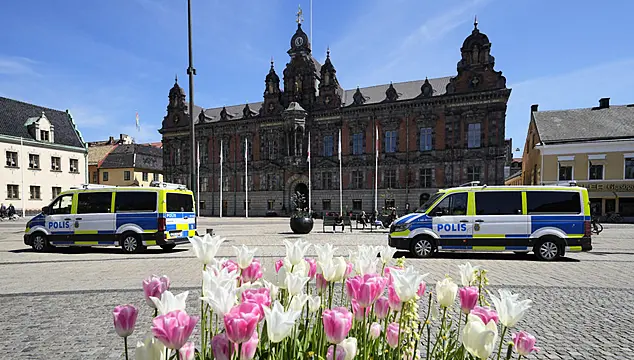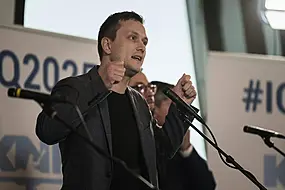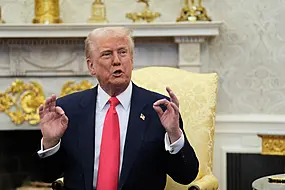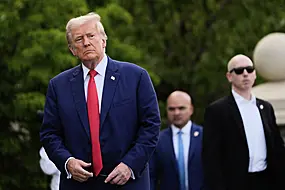A heavy police presence has arrived at Malmo’s main square ahead of protests against Israel’s inclusion in the 2024 Eurovision Song Contest.
Officers in more than five vans arrived in Stortorget ahead of Eden Golan, representing Israel, taking to the stage on Thursday evening in Malmo Arena.
The Swedish Police Authority positioned themselves at various entrance points to the square as tourists walked around taking pictures of the fountain and the town hall.
A pro-Palestinian march will take place in the afternoon, which a spokesman for the force said would cause “disturbance to traffic”.
The organisers of the march say the demonstration will take place at 3pm, with it ending at Molleplatsen park.
Officers from Sweden, along with Norway and Denmark, have been regularly patrolling Malmo Arena, the city centre and the Eurovision village amid Israel facing calls to be excluded from the contest because of the war in Gaza.
The Gaza Health Ministry, run by the proscribed terrorist organisation Hamas, puts the Palestinian death toll at more than 34,000 people.
Golan’s emotional Hurricane was reworked from a previous track called October Rain, which was thought to reference the Hamas attacks on Israel.
There have been continued demonstrations in Sweden over Israel’s participation, and the week of Eurovision has already seen small gatherings in Malmo and at the Eurovision village when Austrian 2014 winner Conchita Wurst was on stage.
Golan, 20, will compete against Norway’s Gate, San Marino’s band Megara, Switzerland’s Nemo and Danish entrant Saba, who called for a ceasefire in Gaza and the “safe return” of Israeli hostages in a joint statement in March.
The artists rejected calls from Palestinian groups to boycott the music contest, saying that they “firmly believe in the unifying power of music”.
Golan, who has been singing and dancing on stage since she was a child, told ITV News this week that she could not have asked “for a better year to be representing my country”.
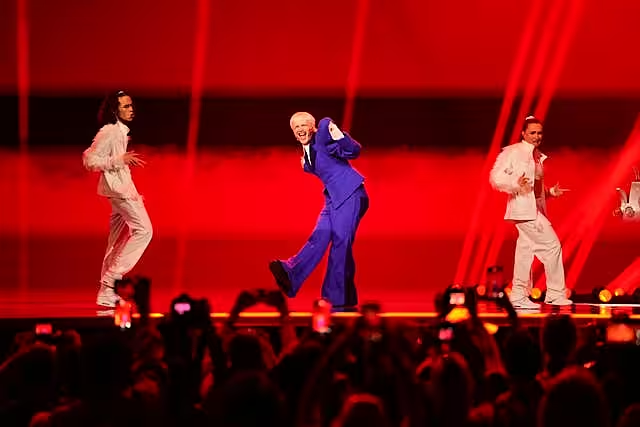
Organisers of Eurovision, the European Broadcasting Union (EBU), hit out in April against the “unacceptable and totally unfair” abuse of competitors amid “the backdrop of a terrible war in the Middle East”.
The group, whose members approved Israeli broadcaster Kan, has taken a strong stance, as in previous years, against political messages at Eurovision and flags and symbols from non-competing countries.
Despite the position, Tuesday’s first semi-final saw former Swedish contestant and opening act Eric Saade wear a keffiyeh pattern material, commonly used by people who want to show they are pro-Palestinian, on his arm.
The EBU said that he “chose to compromise the non-political nature of the event” and it “regrets” the broadcast.
In an Instagram story, Saade said that the material was a “way of showing a part of my origin” and was a gift as a child from his father, who is of Palestinian origin.
He also said: “I just wanted to be inclusive and wear something that is authentic to me – but the EBU seems to think my ethnicity is controversial.
“It says nothing about me, but everything about them.”
It also told Irish finalist Bambie Thug to change their body paint, which referenced the artist’s call for a ceasefire, before going on stage as the EBU maintains this could have broken the rules that are “designed to protect the non-political nature of the event”.

Israel, which performs towards the end of the night, has been a strong contender at Eurovision in recent years, last winning with Netta’s Toy in 2018 and qualifying for the final 12 times since 2003.
It has won a total of four times, and will face tough competition this year from Switzerland’s Nemo, whose operatic-pop music The Code has been seen as one of the favourites to win on Saturday.
The rehearsals have already shown Golan back bending in a white dress before emerging in a circle flanked by dancers as well as being bathed with yellow light as the song reaches its crescendo.
There were shouts at the rehearsals on Wednesday, which reportedly included boos and people saying “free Palestine”.
Netherlands act Joost Klein, with the irreverent and silly Europapa, and Norway’s Gate with folkish Ulveham are also seen as likely to progress to the final.
France’s Slimane with the soulful Mon Amour will also perform on Thursday, alongside Italy’s Angelina Mango with La Noia and Spain’s Nebulossa with Zorra, but is already through to the final as one of the big EBU donators alongside the UK with Olly Alexander and Germany with Isaak.
The 2024 hosts of Eurovision are Swedish comedian Petra Mede and Hollywood actress Malin Akerman.
